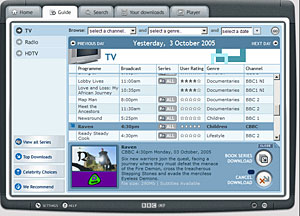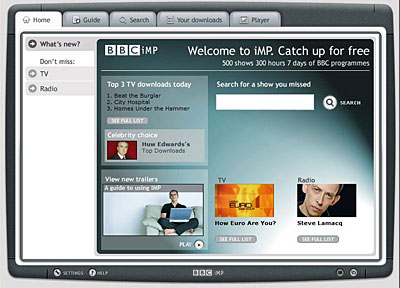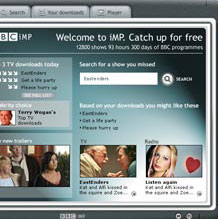 The BBC Trust has given the go ahead for the BBC’s iPlayer service (iMP).
The BBC Trust has given the go ahead for the BBC’s iPlayer service (iMP).
Expected to launch later this year, the iPlayer service lets punters watch TV shows online seven days after the initial broadcast, with viewers also able to download and store programmes on their PCs for up to 30 days.
The green light comes after lengthy public beta trials involving 10,500 individuals and organisations, with BBC director general Mark Thompson declaring himself “delighted” with the decision.
 The BBC will make all episodes of selected series available for download until a week after the transmission of the final instalment, with a storage time limit for downloaded ‘catch-up’ content being limited to 30 days from the time of saving to the hard drive.
The BBC will make all episodes of selected series available for download until a week after the transmission of the final instalment, with a storage time limit for downloaded ‘catch-up’ content being limited to 30 days from the time of saving to the hard drive.
Episodes offered for “catch up” will, however, only add up to 15% of the total content made available by the service.

Initially only available for Windows PC users, BBC Future Media boss Ashley Highfield has said that he hopes to later roll out the iPlayer service to cable TV services, Apple Macs and Freeview boxes.
 Because such a multi-platform roll out would involve the co-operation of many third parties, the BBC says that it is unable to commit to a two-year deadline, but the BBC Trust has said that it will be monitoring the progress and – presumably – give posterior-bound kicks if the Beeb is found to be dragging its heels.
Because such a multi-platform roll out would involve the co-operation of many third parties, the BBC says that it is unable to commit to a two-year deadline, but the BBC Trust has said that it will be monitoring the progress and – presumably – give posterior-bound kicks if the Beeb is found to be dragging its heels.
Commenting on “unprecedented rates of change in technology and audience expectations,” Highfield claimed that the iPlayer, “responds to a need for greater control and flexibility over how and when audiences access BBC content.”
“It is a critical part of the BBC’s strategy to maintain impact and relevance in a world where viewing and listening habits are shifting from linear to on-demand,” he added.
Comments
2 responses to “BBC iPlayer On-Demand Service Gets Green Light”
How long have they been mucking around with this thing?
Typical BBC – they talk a big game, but take for ever to deliver – if ever.
Yes – it’s been yonks since it was first announced.
I first saw it working in September 2003, then reported on its content being DRMd in 2004.
While we all understand that these thinks take time, it must be really frustrating for the developers involved with the project (Ben Lavender the ideas originator especially) to take FOUR years to get from a working version to the point where it’s been agreed that it’s OK to do – especially when he’d given up his xmas 2002 to work up the idea.
As much as the BBC wants to portray itself as this groovy New media company – the reality is that it’s a leviathan that changes direction slower than a super tanker.